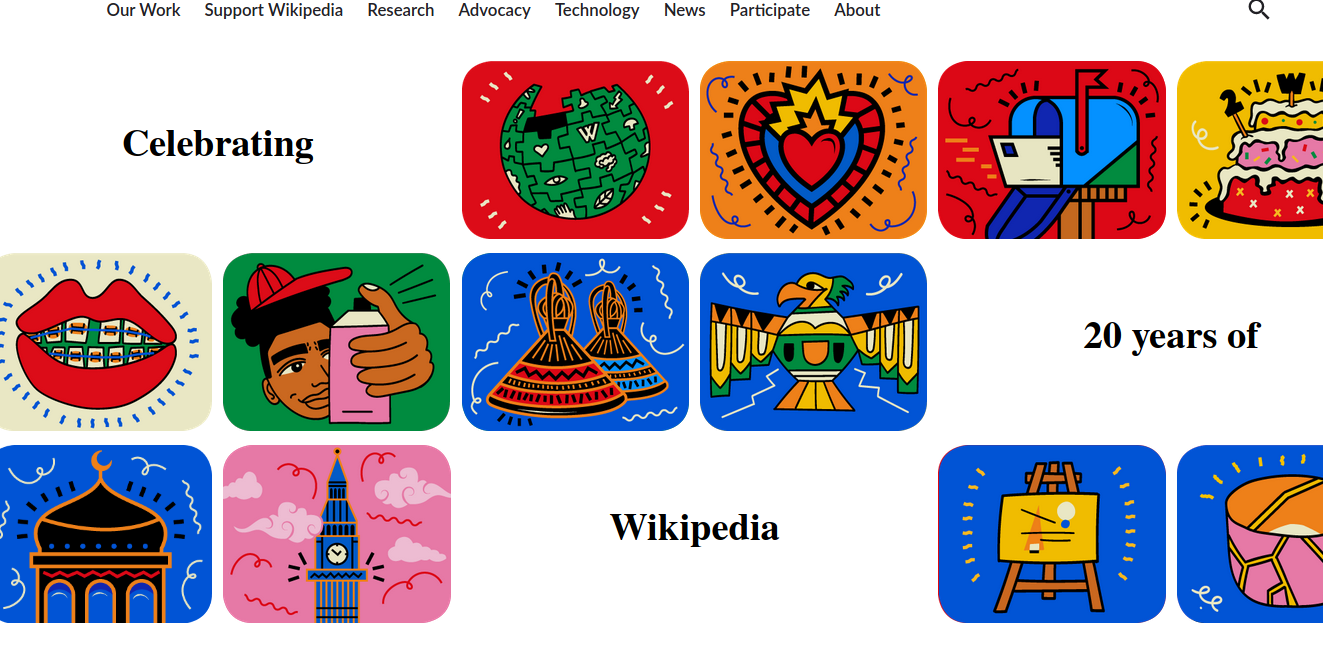20 Years of Wikipedia
Wikipedia is 20 years old this year. Congratulations! Celebrations abound across the Internet.
As a scholar of Wikipedia and a FOSS Academic, I wanted to weigh in on the birthday and provide a short history lesson. (This is, therefore, a Goal 2 post).

The reporting on the 20th birthday of Wikipedia (e.g., MSN) suggests that Wikipedia was always going to be non-profit. That's not exactly true. Wikipedia's URL was initially wikipedia.com, and it was intended to be a for-profit site. As I discuss in my book Reverse Engineering Social Media, a key event in 2001, dubbed "The Spanish Fork Labor Strike," pushed Jimmy Wales to make the site into a non-profit instead of a commercial venture.
During a mailing list discussion, Wales noted that Wikipedia would start selling ads around its content. He was a veteran of this type of venture, having sold ads on a porn search engine back in the mid-1990s.
The specter of ad sales around voluntarily-provided content upset many Wikipedians, most notably a growing community of Spanish-speaking editors who were working to make Wikipedia an international project. Because Wikipedia was licensed with the GFDL, Spanish-speaking Wikipedians could take the articles they were writing and port them to another site. They did so, moving to the Enciclopedia Libre Universal en Español in protest over Wales's announcement about ads (as well as their discontent with Larry Sanger's management style).
Wales heard their grievances and agreed with them: there would be no ads, Sanger would be fired, and Wikipedia would be a non-profit.
Edgar Enyedy and his colleagues deserve a great deal of credit for pushing the nascent Wikipedia to become a non-profit. And to be fair, credit should go to Wales for recognizing the legitimacy of the Enciclopedia editors' greivances.
However, this important event is getting lost to history. Nathaniel Tkacz documented it well during the 10 year anniversary with his interivew with Enyedy, but since then, the Spanish Fork seems to be overlooked. It's mentioned only in passing in the new MIT Book Wikipedia @ 20:
First, Wikipedia was conceived by Wales as a likely commercial undertaking. Wikipedia was originally hosted at wikipedia.com, and by 2002 Sanger and Wales were hinting that Bomis might start selling ads on Wikipedia, in part to pay Sanger’s salary. Wikipedians objected—Spanish Wikipedians even left to create their own. Given these objections and the deflation of the dot-com bubble, Sanger was laid off. Wales changed the site over to a .org domain and began work to establish the non-profit Wikimedia Foundation, which happened in 2003.
So we should thank the Spanish Wikipedians for the site's current non-commercial status.
Their strike has brought about many benefits. Unlike so many other websites, Wikipedia has no real infrastructure for behavioral advertising profiling. The Firefox plugin NoScript shows that it's not tracking -- a refreshing change of pace when compared to contemporary sites that are larded with tracking scripts.

Unlike many other sites, which are constantly tweaked to increase click-through rates on ads (a practice now dubbed "dark patterns"), Wikipedia's interface is remarkably stable. It looks pretty much the same as it did 20 years ago. Rather than seeing this as stagnation, those of us who decry changes in interfaces should celebrate Wikipedia's now intuitive interface.
While Wikipedians are not interested in tweaking the interface to increase attention on ads, they are constantly tweaking the social structures that help administer pages, with debates over policies, efforts to include more articles about women, efforts to translate the encyclopedia into yet more languages, and a de-facto social networking system where fixing grammar is celebrated.
While Wikipedia did change its licence from GFDL to Creative Commons, the change has only cemented its place as a bastian of open cultural production.
For my part, I've donated to Wikipedia. I've contributed to it. I've encouraged students to edit it. I rely on it all the time. The FOSS Academic Lifestyle Dream would be incomplete without it.
And a point that I don't think we're making enough as misinformation spreads like a deadly virus across corporate social media. Wikipedia was once the poster child of misinformation. Back in the mid-2000s, Wikipedia-bashing was a popular sport. It was the wild and wacky Wikipedia where vandals and trolls reigned and misinformation was rampant. But very early on in its history, Wikipedia demonstrated the adage about many eyes and bugs: vandalism and uninformed opinion is rooted out rather quickly on Wikipedia, rather than being allowed to spread.
Once again, I think back to the Spanish Fork and their labor strike: pushing the site to be non-profit and to never have ads has rescued it from the logic of corporate Web 2.0. While other sites mire in the muck of misinformation, while other sites track us, while they constantly develop more pernicous dark patterns, and while the commercial web exploits our emotions and attention, Wikipedia has just carried on, with people writing articles and citing their sources.
Kudos.
